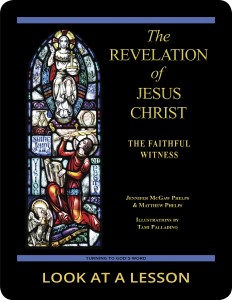time
 As we approach the end of Ordinary Time, our Mass readings focus on completion and the end or fullness of time. In the Gospel According to Luke 21:5–19 (NABRE), Jesus talks about the eventual destruction of the Temple in Jerusalem, which becomes a metaphor for the destruction of all things.
As we approach the end of Ordinary Time, our Mass readings focus on completion and the end or fullness of time. In the Gospel According to Luke 21:5–19 (NABRE), Jesus talks about the eventual destruction of the Temple in Jerusalem, which becomes a metaphor for the destruction of all things.
The reading addresses how people will know when the time has come and creates the impression that there is a set point in time, i.e. a specific date, when all these things are ordained to happen. The Greek concept presented here, though, is somewhat different. The Greek word καιρός (kairos) most literally means “a due measure” or “fullness.” When used in a temporal sense, this word can mean something like “in the fullness of time,” but it additionally could refer to the need to meet specific requirements—when everything is ready.
How does this emphasis in meaning affect your view of the end times? When do you think it is that Jesus will return?
related topics: Ordinary Time; times & seasons
you also may like our study of the book of Revelation
 The Revelation of Jesus Christ: The Faithful Witness, a 23-lesson Catholic Bible study with an imprimatur, examines ways in which our traditional Christian view of heaven is built on Hebrew apocalyptic visions recorded in the Old Testament. This recently revised study includes maps and additional commentary and takes a close look at the role of the prophets in present-day Christianity. Illustrations by Tami Palladino depict the often-misunderstood images in the book of Revelation. Click on the book’s cover to view a sample lesson.
The Revelation of Jesus Christ: The Faithful Witness, a 23-lesson Catholic Bible study with an imprimatur, examines ways in which our traditional Christian view of heaven is built on Hebrew apocalyptic visions recorded in the Old Testament. This recently revised study includes maps and additional commentary and takes a close look at the role of the prophets in present-day Christianity. Illustrations by Tami Palladino depict the often-misunderstood images in the book of Revelation. Click on the book’s cover to view a sample lesson.
 Click on the picture of the statue of Moses with horns (above) to learn more about Lost in Translation. A new entry is archived each Monday. Contact us to receive Lost in Translation by email every week. You may use any of the contact links on our website to ask Matthew a question.
Click on the picture of the statue of Moses with horns (above) to learn more about Lost in Translation. A new entry is archived each Monday. Contact us to receive Lost in Translation by email every week. You may use any of the contact links on our website to ask Matthew a question.
